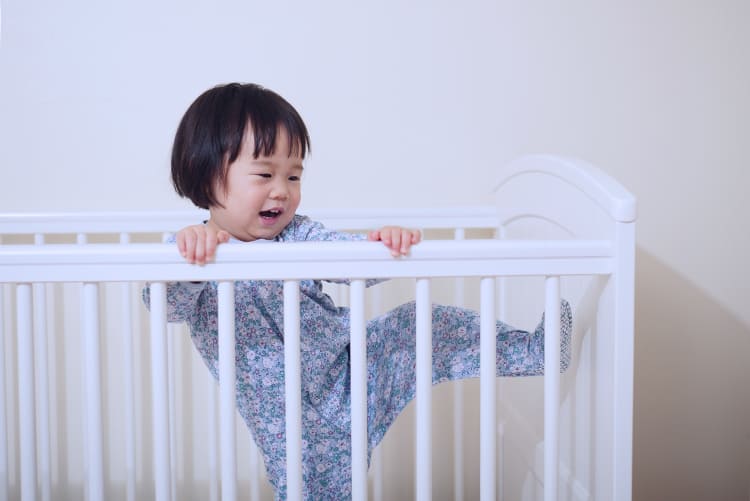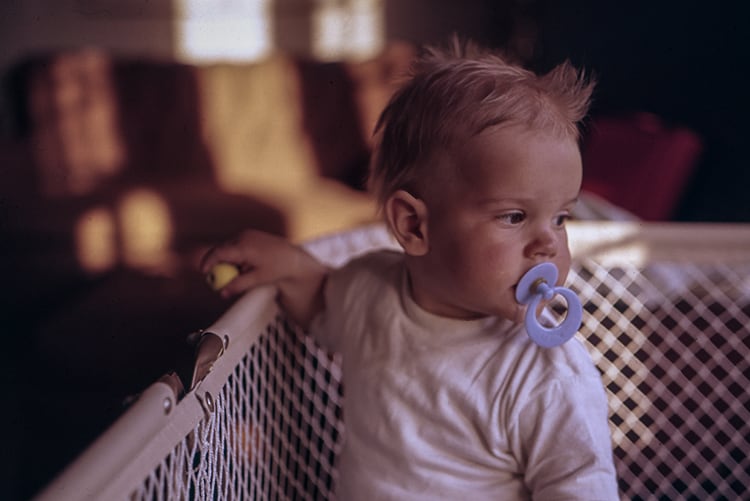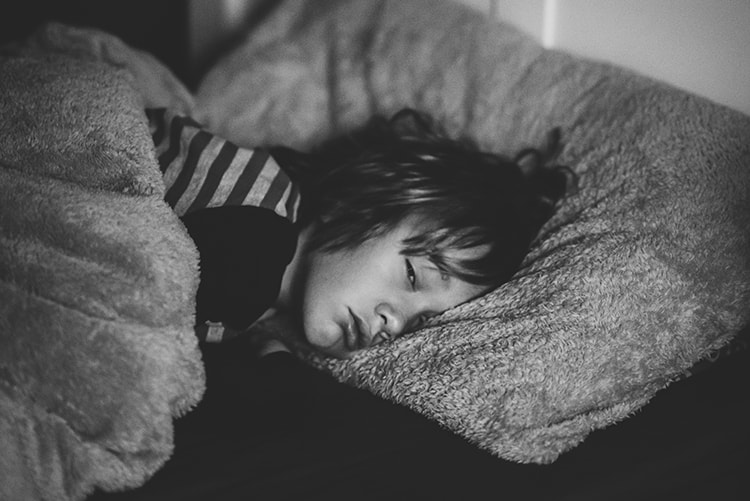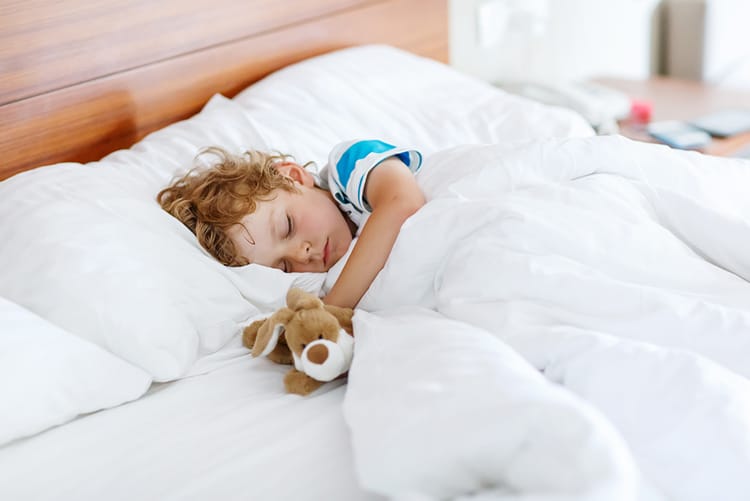You’ve done the hard work of getting your baby to sleep on a schedule and now you are terrified about messing up their progress. Don’t worry! the only way to create new baby sleep problems after sleep training is to blatantly restart old unhealthy habits, which your child will not enjoy anymore because they now know how to put themselves to sleep. Phew, that’s good news!
Let’s discuss the top 4 things that can lead to baby sleep problems:
When babies are overtired they don’t sleep well.

This happens when your child has incurred sleep debt and is so tired that instead of feeling sleepy, they catch a “second wind” and fight sleep. So even though they are tired and need to sleep, they will not sleep so easily. Over-tiredness causes include not getting enough sleep during naps or at night time. Once your baby has reached this state, be patient. Go back to the routine at the next opportunity and get your baby to sleep.
Skipping naps or allowing late bedtimes lead to sleep disturbances.

Don’t let anyone tell you that you should let your little one skip a nap (no matter how many months old they are) because it will be followed by over-tiredness. Of course there will be times that you have to skip a nap due to unforeseen circumstances or have to accommodate a later bedtime. The important thing to remember is to prevent creating a new habit that is not conducive to healthy naps and bedtimes. For instance, don’t go back to feeding/rocking/holding to sleep because of an uncommon situation.
How to deal with sleep disturbances while traveling.

Traveling with your infant or baby can seem like a scary event, especially if you’ve recently completed sleep training and your baby is sleeping so wonderfully! Don’t fret! Although travel can disturb a routine sleep pattern, those disruptions don’t last for long. It’s likely that the first night of your first travel adventure, post sleep training, won’t be ideal. But the sleep patterns should iron out by the second night. The more that you travel your baby, the easier it gets!
Also, note that when you are traveling, don’t over schedule your activities and skip baby’s naps. Once vacation is complete and you have returned home, it’s important to get back into your routine. By including naps on vacation the transition back to home life is so much easier. BabyQuip also makes it less-stressful on traveling families by providing baby gear rentals to make your vacation experience feel more like home. Try to create a homelike environment for baby at your destination. Renting a full-sized wooden crib is a great idea!
Related Articles:
- 7 Confessions of a Sleep Consultant
- Best Sleep Schedules for Infants & Toddlers
- BabyQuip Baby Gear Rentals: How to Get Started
Baby sleep problems can arise from noise during nap time and night time.

The dreaded garbage truck, lawn mower or birds chirping outside can be a real nuisance when your baby is in their light sleep phase. This stage of the sleep cycle means that baby can be easily aroused or awoken. If your child is waking up consistently at 5am, it could be the noise outside. Set your alarm (not loud enough for baby to hear!!) and pay attention to what may be waking baby up earlier than normal. Some noises can’t be prevented but they can be muffled by using a white noise machine in baby’s room.
How to overcome various sleep problems.

Go back to the basics and review the Best Sleep Schedules for Infants & Toddlers blog for more advice.
1. No external props:
Babies need to learn to fall asleep independently without external props. An external prop is anything that the child needs to fall asleep; pacifier, rocking, feeding (when not hungry), etc.
2. Set an early bedtime:
The best bedtime is anywhere between 6-8pm. Children are early risers and we need to ensure that they get their full 12 hours of rest at night, so that’s the reason for the early bedtimes. Putting your child to bed late will NOT result in a later wake-up, it will actually encourage an earlier wake up (5am or earlier). You don’t want that!!
If your child is overtired, it could be due to the fact that the bedtime is too late in the evening and the child is waking up earlier than the 12 hour stretch to start their day.
3. Don’t skip naps:
If you skip naps, sleep debt will follow you for the next 24 hours. If noises are contributing to shorter than normal nap lengths, incorporate a white noise machine to help drown out sounds from inside and/or outside the home.
4. Set a routine:
Routines are the heavily researched and are highly recommended by healthcare professionals for children AND adults when it comes to healthy sleep patterns. As a matter of fact, routines can help the body produce more melatonin, the “sleepy” hormone. Bedtime routines should not be more than 30 minutes and nap time routines no more than 10 minutes. You can incorporate any wind down activity into the routine; story, songs, bathtime, etc.
5. Stay consistent:
If you are seeing desired results in your child’s sleep progress, that’s great, but it’s important to remain consistent. Sleep training takes some time and you are likely not going to see instant overnight results. It takes a few days to get your child on their healthy sleep journey, sometimes even a week. Don’t give up!
If you’ve had a recent disturbance or baby sleep problem, and it feels like there is no hope in getting your child back on track, please reach out to me! I’m happy to help. The fastest way to reach me is through email: [email protected] or text “sleep help” to (315) 681-5003.

Tonja Bizor is a Certified Child Sleep Consultant and Public Speaker who helps parents teach their children healthy sleep habits. She specializes in getting children aged 3 months to 3 years old to sleep 12 hour, uninterrupted nights. She’s helped over 50 families move from sleep deprived to sleep filled nights.
Tonja offers group seminars and private, one-on-one coaching with families, where she develops individualized customized sleep plans for parents to follow.
Tonja completed her Masters degree in Psychology with an emphasis in Clinical/Counseling. She studied under Dana Obleman and achieved her coaching Certification with the Sleep Sense Program.
Tonja was a guest on Talk of Alabama on ABC and she’s been featured in numerous magazines and websites such as Romper, Military Spouse Fest, Birmingham Parent Magazine and Dr. Laura.
Tonja can be reached through her website: www.tonjabsleepconsulting.com or by email at [email protected]. Follow her on Facebook and Instagram for sleep tips! @tonjabsleepconsulting



Wow! I had no idea that this stuff was so disturbing to a child’s sleep. Thanks for the info. I might be calling you soon too. My baby is a terrible sleeper.
Thanks for this blog. I needed it.
I found this post a while ago and impletmented this sleep schedule to a T. This was a LIFESAVER! Seriously, I can’t say enough how well this worked. I’m a happier mom because I get rest and my baby isn’t as fussy throughout the day and sleeps well for longer stretches. If you haven’t tried this, I highly recommend it.
taking this into consideration i let my baby sleep on me too much cause i don’t want her to wake up but then i can’t do things i need to